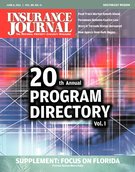P/C Industry Wins Some, Loses Some in Scott’s First Session
It is axiomatic in Florida that when it comes to the legislature and insurance issues, the power brokers play to the last 72 hours. No matter how many committee meetings, no matter how many press conferences, no matter how many hours of lobbying, it all comes down to the last three days when the jockeying between issues is at its most bruising and everyone finally has to decide, “Do we cut a deal or do we just go home?”
This year, however, was shaping up differently. Yes, the main property bill had yet to be passed, but despite a glaring political spotlight and several close votes, its fate had largely been determined for weeks. And the other main insurance bill, a collection of largely regulatory and administrative changes, was already on its way to the governor. As for the industry’s remaining agenda, including reforming the state’s no-fault auto law and trying to rein-in the quasi-governmental property insurer Citizens’ Property Insurance Corp., they had already joined the flotsam and jetsam of hundreds of legislative issues discarded along the way over the 60-day session.
For some in the industry, the property bill alone is enough to call the session a success. But the expectations had been higher, especially with the election of Gov. Rick Scott, who swept into office declaring that he would make the state the most “pro-business” in the country. Scott’s election combined with strong Republican majorities in both Florida’s Senate and House of Representatives offered the possibility of one of those rare political alignments that can lead to a fundamental reshaping of insurance markets.
In the closing days of the session, however, it was apparent that despite some Herculean efforts on the behalf of the industry it would not be the case in 2011. And so as the last gavel fell, there was a feeling among many that 2011 was a lost opportunity. Perhaps that is why some industry onlookers were consoling themselves that at least they hadn’t been forced to switch to a defensive posture and start killing bills that would have hurt their cause. “At least we stayed on the offense,” said one lobbyist.
The Perils of Property Insurance
When the session started, Citizens had 1.3 million policies and counting, the state’s sinkhole plagued south-central counties had turned into an Arabian desert, and private insurers were filing for double-digit rate increases. When the session opened on March 8, the industry came armed with a three-prong strategy: address the sinkhole crisis and the other cost drivers that were weighing down companies’ balance sheets; find some way to restructure the balance between the private market; and carve out a path where companies could raise some rates without seeking regulatory approval.
The industry’s opening gamut came in the form of three bills aimed at addressing each of those issues. They were a bill that would have allowed insurers to raise rates by up to 15 percent annually without state approval, another addressing the rise in sinkhole costs that included a provision removing the mandate on private insurers that they even provide sinkhole coverage and another targeting Citizens by allowing it to raise rates beyond the current 10 percent annual cap.
It was an aggressive agenda, one that no one expected to see enacted as drawn. However, it laid out the contours of the debate that followed, which time and time again was a classic seminar on the virtues of free-market capitalism versus the need to regulate an industry defined by profit. That was especially the case with the rate deregulation bill. It was a political non-starter but allowed the bill’s sponsor Sen. Alan Hays (R-Umatilla) to rail against regulation in favor of the market. “This is the land of the free, the home of the brave, where we have freedom of choice,” said Hays. “It is an insult to consumers of this state to say you can’t have the choice under this bill.”
The primary property bill, SB 408, aimed to save an industry whose balance sheet was bleeding red ink largely due to sinkhole losses. The statistics tell the story. The Office of Insurance Regulation reported that sinkhole claims had jumped from 2,360 in 2006 to 6,694 in 2010 at a total cost to insurers of $1.4 billion. Citizens’ policyholders in Pasco County alone are paying an average sinkhole premium of $1,000. Sinkhole claims were siphoning off much needed surplus to pay any hurricane losses.
“Even without a hurricane catastrophe for five years, insurance companies have not been able to build a surplus,” said bill sponsor Sen. Garrett Richter (R-Naples). “Meanwhile, sinkhole claims have unexpectedly and mysteriously quadrupled over this time period. There is something wrong with that.”
Hays went as far as to say private insurers shouldn’t even have to cover sinkhole losses. But the specter of even more policies being diverted to Citizens quickly killed that idea. Still, SB 408 contained much the industry wanted and needed. Among other things, the bill defines a statutory definition of “structural damage,” places a two-year statute of limitation on claims, and institutes a number of fraud provisions. The industry also got some other much needed help in the area of reinsurance rates and replacement cost coverage.
Even so, no one expects the bill alone to revitalize the market, especially with the lack of Citizens’ reforms.
“I don’t think this is a market turnaround bill,” said Property Casualty Insurer Association of America Regional Vice President William Stander. “Citizens needed reforms as much if not more so than the private market.”
Ironically, the person who may be the most responsible for killing Citizens reform was the man who seemed the most bent on radically reforming the insurer. Halfway through the session, the news broke that Gov. Scott had held meetings with private insurers declaring his intent to close Citizens in four years. The story became front-page news and led to a political firestorm that cast the governor as colluding with private business at the expense of homeowners.
Stander said there were no private meetings with the governor, pointing to the fact that Scott campaigned on the issue. Even the industry was quick to oppose an idea that ignored the reality of a market that was in no position to absorb 1.3 million policies. Even some GOP leaders turned against the governor. The controversy confirmed that Citizens has become the third rail of Florida politics when it comes to insurance.
Florida Association of Insurance Agents President Jeff Grady agrees that the controversy surrounding Scott and Citizens did take the issue “off message.” Either way, he said, without crucial reforms, including restricting any Citizens’ rate increase to 10 percent per year, he expects few changes in the market. “How can Florida expect to attract new capital to its residential homeowners market when the state’s own insurer represents such fierce competition?” he said.
In retrospect, the outcome of property reform largely turned on one overriding issue: the reality that both the rate deregulation and Citizens’ bills would have led to increases in homeowners’ rates and despite all the risk it proved a step too far. “Politically, legislators were not prepared to legislatively implement a rate increase,” Stander said.
The Fall of PIP
They came at it with everything they had. There were elected officials, trade associations, law enforcement officials, consumer groups, stacks of statistics, numerous press conferences. Yet still the effort to reform the state’s personal injury protection law came up well short of the mark. Given the failure of the 2011 effort, those backing PIP reform are questioning if not now, then when? Can PIP be reformed at all?
The strategy behind PIP was to raise the public awareness surrounding fraud and hopefully use that momentum to convince lawmakers to place cost controls on medical services and litigation expenses. From the point of view of fraud, there was certainly plenty of ammunition. An OIR report showed PIP claims increasing by 40 percent between 2006 and 2010, while at the same time insurers costs rose by 66 percent. At the same time, the National Insurance Crime Bureau ranked Tampa and Miami in the top five cities in the nation for bogus accidents.
As the session opened, the fraud angle proved a success by pushing PIP reform into the third spot on the insurance agenda behind property and Citizens. However, when the industry pivoted and went after medical costs and litigation expenses, the combined opposition of health care providers and trial lawyers proved too strong to overcome. “The people on the other side; they fight hard,” said Grady.
Lawmakers did add several PIP-related amendments to SB 1215, which became a catch-all bill for miscellaneous insurance measures. Among the amendments is one requiring police to gather more information about crash victims, another establishing civil penalties for fraud violations that would be used to fund a non-profit entity charged with looking into fraud.
Looking forward, many in the industry are debating whether to abandon the quest for PIP reform and go back to the drawing board and consider trying to scrape the insurance scheme altogether. In 2010, Florida did briefly repeal PIP, which led to a split in the industry with domestic companies insisting it be reinstated while national companies like State Farm opposed.
Tort Reform
As part of Scott’s goal of making Florida the most “pro-business” state in the country, he campaigned heavily on the issue of tort reform, as did many lawmakers. Lawmakers did address the so-called “Crashworthiness Doctrine,” so that judges and juries can consider the fault of all parties in product liability cases. The bill reverses a 2001 Florida Supreme Court ruling in D’Amario v. Ford Motor Company. In that case, two intoxicated minors were involved in an accident resulting in the death of a driver. The surviving minor sued Ford alleging that a defective relay switch caused the injuries. A lower court allowed in the fact that the minors were intoxicated and Ford prevailed. The Supreme Court, however, reversed the ruling on the basis the court shouldn’t have let in the fact the minors were intoxicated.
Sen. Garrett Richter (R-Naples) said the bill is needed to restore the judicial process to its initial intent of giving everyone his or her say before being judged. “The jury needs the tools to make informed decisions and we must allow vital and relevant information to be heard.” Richter said. “Lady Justice is blind, but she isn’t deaf.”
Unheralded Successes
As with every legislative session, there are other insurance bills that do get passed with less fanfare that are important to the industry. Commercial lines insurers were successful in getting lawmakers to add to the list of policies it can set rates without seeking prior approval from the state. Now, rates are now deregulated on all motor vehicle fleets and on policies covering fiduciary and general liability, non-residential property and non-residential multi-peril, excess property, and burglary and theft risks.
The Florida surplus lines industry was also brought into compliance with the federal Nonadmitted and Reinsurance Reform Act of 2010. Under the bill, Florida will no longer have jurisdiction to collect taxes and fees on surplus lines policies on risks located in the state unless Florida is the home state of the insured. Looking forward, however, it is estimated that the change could result in a loss of assessment income from between $7.5 million to $17.5 million that will have to be made up somewhere else.
Lawmakers also approved a medical malpractice bill (HB 479) that requires out-of-state doctors to apply for a certificate to testify as an expert witness in Florida trials. The certification allows the state to discipline out-of-state doctors if they are found to have offered “deceptive or fraudulent” testimony. The measure provides some immunity from suit for doctors who volunteer to help high school and collegiate sports teams. But senators took out a hospital-protecting provision and said those facilities still need to be held accountable to injured patients.
And then there were those issues that thankfully hardly mentioned. Workers’ compensation was barely mentioned except for a few technical changes, a situation that was mirrored when it came to regulations governing agents.
Topics Carriers Legislation Florida Fraud Excess Surplus Property
Was this article valuable?
Here are more articles you may enjoy.


 The $3 Trillion AI Data Center Build-Out Becomes All-Consuming for Debt Markets
The $3 Trillion AI Data Center Build-Out Becomes All-Consuming for Debt Markets  Zurich Reveals Beazley Stake After UK Insurer Spurns Bid
Zurich Reveals Beazley Stake After UK Insurer Spurns Bid  Beazley Agrees to Zurich’s Sweetened £8 Billion Takeover Bid
Beazley Agrees to Zurich’s Sweetened £8 Billion Takeover Bid  India’s GIFT City Attracts Lloyd’s and Other Global Reinsurers, Sources Say
India’s GIFT City Attracts Lloyd’s and Other Global Reinsurers, Sources Say 


